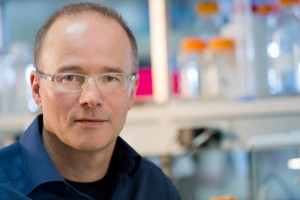Hugo Vargas, M.D., and Peter Storz, Ph.D., named 2016 Investigators of the Year at Mayo Clinic in Arizona and Florida
Hugo Vargas, M.D. (GI ’00), Division of Hepatology at Mayo Clinic in Arizona, and Peter Storz, Ph.D. (CB ’12), Department of Cancer Biology at Mayo Clinic in Florida, were named 2016 Investigators of the Year in Arizona and Florida, respectively. The award recognizes researchers who have made significant advances that have strongly influenced their fields of research.
2016 Investigator of the Year Hugo Vargas, M.D.
Dr. Vargas is a nationally and internationally renowned expert and investigator in hepatology, liver transplantation and hepatitis C virus. His publications include more than 100 articles in peer-reviewed journals, numerous book chapters and a scientific textbook. In his clinical research, he is recognized for developing infrastructure and using a team approach to successfully recruit patients for his studies and publish results. He is considered a role model for conducting successful clinical research at Mayo Clinic. He also is a director of the Office of Clinical Research, a professor of medicine, vice chair of the Arizona Research Operations Management Team and chair of the Clinical Research Committee in Arizona. He serves on the Mayo Clinic Research Clinical Trials Subcommittee. He joined Mayo Clinic in 2000.
2016 Investigator of the Year Peter Stroz, Ph.D.
Dr. Storz was recognized for his contributions in the role of protein kinases in cancers such as pancreatic. His research focuses on uncovering the signaling events underlying pancreatitis and the development and progression of pancreatic cancer, as well as uncovering signaling pathways that regulate metastasis of cancer cells. Work underway in his laboratory also focuses on understanding how an inflammatory environment in the pancreas contributes to development of pancreatic cancer with a goal toward gaining knowledge that allows for the advancement of early detection methods and novel treatment strategies that are more effective than current therapies. He is an associate professor of cancer biology and a principal investigator for several research studies funded by the National Institutes of Health and the National Cancer Institute. His findings have been published in more than 90 articles in prominent peer-reviewed journals. He joined Mayo Clinic in Florida in 2005
